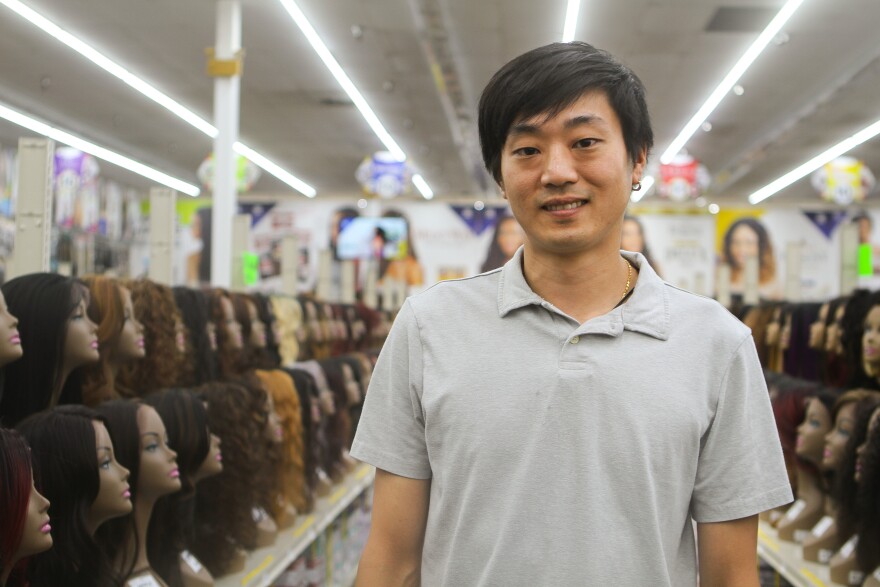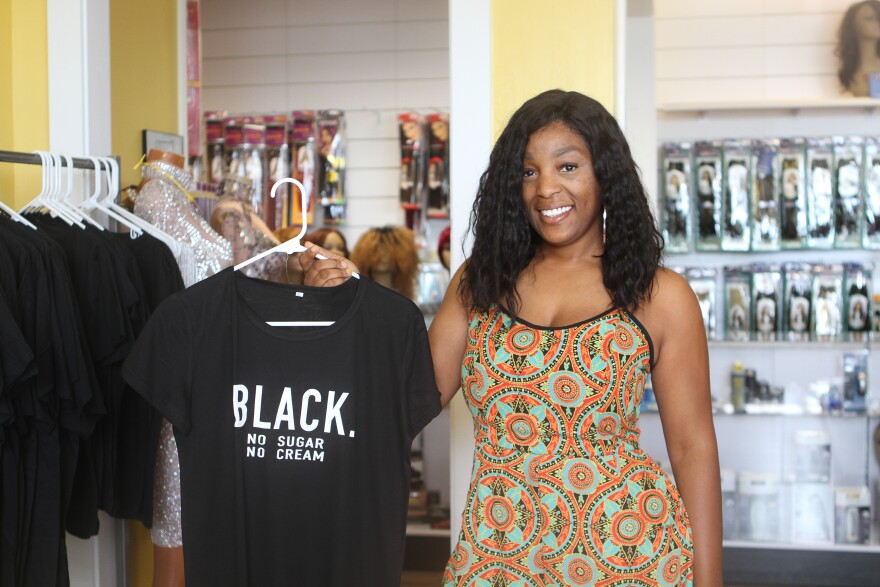A U.S. Hair & Beauty employee rapidly scans the barcodes of the latest shipment of hair extensions. Black, burgundy and chestnut brown weaves pile up on the floor as she throws one pack down to pick up another.
U.S. Hair & Beauty is the biggest beauty supply business in Columbus, at seven stores and growing.
“We’ve averaged opening one store every two years," says general manager Ed Chang. "Last year, in 2017, we were able to open two stores in one year: the 161 store and the James Road store.”
The two newest locations boast more than 20,000 square feet of floor space. Shelves are lined with hair pomades, shampoos and twisting gels. Thousands of hair extension packs are neatly displayed against store walls from ceiling to floor – synthetic and human hair, curly and straight, twisted and loose.
They’ve been in business for 30 years, after opening their first store in Cleveland in the late 1980s.
“In the '90s, the current owner took over U.S. Hair,” Chang says. “We’ve expanded from the little corner store types to the multi-supersized stores.”
Black beauty is a big business. More than 80 percent of last year’s spending on ethnic hair and beauty aids was attributed to black consumers, according to a 2018 Nielsen demographic spending report. But almost three-quarters of the country’s beauty supply stores are owned by Korean-Americans.
Slowly, that marketplace is shifting into the hands of African-Americans, including right here in Central Ohio.

How Black Hair Became A Korean Business
Ninety-nine percent of U.S. Hair & Beauty's customers are black - a similar figure to the beauty supply industry at large.
“Black people shop at beauty supplies because when you go into a store they’ll have a section called the 'ethnic hair care' section, and they can be anywhere from one shelf to four feet to eight feet depending on the size of the store and location,” says Sherman Willis. “But they’re only stocking selected items."
Willis co-owns Willis Beauty Supply, a store on Livingston Avenue.
“The black consumer, they have a bigger category than just four or five selections of one item," Willis says. "So you go to a beauty supply because normally beauty supplies carry the full line of products.”
Even though the customer base for beauty supply stores is overwhelmingly black, Sam Hwang, vice president of the National Federation of Beauty Suppliers, says 70 percent are owned by Korean-Americans. The group oversees 30 regional beauty supplier interest groups.
“Most of the hair manufacturing was done out of Korea back in the day,” Hwang says. “It was real human hair so it was really expensive, but many of the Korean women actually cut off their hair to sell for the hair industry to grow.”
By the 1970s, most importers and exporters of hair were Korean. Some first-generation Korean-Americans went to work for and eventually own beauty supply stores. Korean immigrants began selling wigs in stores, when products were previously sold door-to-door.
“Otherwise, where were you going to go buy these beauty supply products if Koreans weren’t there?” Hwang says.

Many stores in the U.S. have seen several generations of Korean-American owners, but Hwang says the industry is shifting.
“The second generations kind of grow up and say, ‘I’m never gonna be like my parents.’ So I guess it’s natural to not wanna be in this business,” Hwang says. “They’d rather have a job or a different profession.”
A Tough Business
WOSU spoke with three second-generation Korean-Americans whose parents own beauty supply stores but are hoping to go into different professions. All declined to be recorded.
The dynamic is familiar to Phillip Han, though. He owns Hair Joy Beauty Supply on Cleveland Ave., taking over the store from his father-in-law 20 years ago.
“First, I tried to study at OSU," Han says. "But we have a baby. And well, I cannot keep studying because I needed money."
He is encouraging his children to pursue other paths. One of his sons now studies at Ohio State, and the other two kids are in grade school.
“Absolutely, I don’t want to give to my kids,” Han says.

One reason why: The store is open 11 hours a day, seven days a week. It’s demanding work, and Han wants his kids to find professions with better work-life balance.
“So all the time I told my kids, ‘Yeah, please, do something else. Spend more time with your family. Family is first,’” Han says.
Hwang says Han’s desire to have his kid do something else is part of a generational shift in the industry.
“I see the Korean numbers slowly, every year more rapidly, declining in number,” Hwang says. “In 10 years, tough to say, but I see less than 30 percent" of beauty suppliers in the U.S. being Korean-American owned.
More Black Owners
Two major shifts in the beauty supply industry are happening at the same time: More black women are sporting natural hair, and as Korean-Americans leave the industry, the stores that long catered to black customers are increasingly moving into black ownership.
The Black Owned Beauty Supply Association says there are now about 3,000 black-owned beauty supply stores in the country. That’s about 150 more than last year.
Temika Morris is one of those new black entrepreneurs. She opened Ms. Melanin in Canal Winchester last year.
“As I did research, I realized 99 percent of the revenue that comes into these stores are by black women,” Morris says. “But then I realized the few number of stores that are owned by black women.”

Morris cannot afford to buy some products in enough bulk to have competitive pricing with other stores, so she focuses on experience instead.
“Going in, I knew I couldn’t compete one-for-one with the Asian stores because they’ve been around for 50 years, 30 years,” Morris says. “So the focus has always really been customer service and putting the spotlight on black women.”
The Black Owned Beauty Supply Association says that, including Ms. Melanin, there are now seven black-owned beauty suppliers in Ohio.







